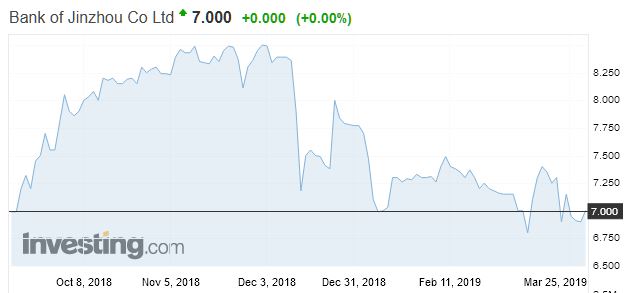On 28 July, Bank of Jinzhou reported that some of its shareholders had sold a portion of their domestic shares to ICBC Financial Asset Investment Co., Limited, a wholly owned subsidiary of Industrial & Commercial Bank of China Co., Ltd.; Cinda Investment Co., Ltd, a wholly owned subsidiary of China Cinda Asset Management Co., Ltd.; and China Great Wall Asset Management Co., Ltd.
According to Bank of Jinzhou’s announcement, the transactions were conducted with the support and guidance of the local government and financial supervising authorities. ICBC and Cinda have announced their investment in the bank, while Great Wall has not confirmed the transaction. Via Moody’s.

The share sale is credit positive for the creditors of Bank of Jinzhou, which delayed the release of its 2018 annual report and suspended trading of its shares in April 2019 on the Hong Kong Stock Exchange. The three new shareholders are all institutions with strong financial resources, experience and government backing, which will support market confidence and could facilitate further measures to strengthen Bank of Jinzhou’s balance sheet and operations. ICBCFAI was established in 2017 to expedite debt-to-equity swaps and conduct distressed asset management business for ICBC. Cinda and Great Wall are two of the big four asset management companies in
China that handle distressed assets.
More generally, the share sale is also positive for other financially distressed regional banks because it shows that the Chinese authorities are focused on reducing potential contagion from failing regional banks. In the case of Bank of Jinzhou, the share sale will allow ICBCFAI, Cinda and Great Wall to take an active role in supporting the lender.
It also contrasts with the authorities’ takeover of Baoshang Bank in May 2019. The authorities initially opted to underwrite a significant amount of Baoshang Bank’s retail customers’ liabilities while having wholesale customers face some losses. However, they decided to underwrite almost all of the bank’s liabilities after the financial markets turned more volatile and smaller and regional banks faced funding pressure from the interbank market.
Although Bank of Jinzhou’s share sale and Baoshang Bank’s takeover may alleviate market fears of contagion risks and stabilise the banks’ credit quality, they will not fundamentally improve the financial standing of regional banks, many of which remain weak links in China’s financial system. In addition, the sale of the shares by some of Bank of Jinzhou’s original shareholders, though conducted at quite a deep discount to the bank’s last traded share price before the trading suspension and book value, could increase the risk of moral hazard.
The impact of the transaction, which indicates an expanding role for ICBC in supporting distressed regional banks, is immaterial to ICBC’s supported credit profile. However, the transaction could weigh, albeit marginally, on ICBC’s standalone credit profile. ICBC made the investment through ICBCFAI and Bank of Jinzhou will not be consolidated in ICBC’s accounts. ICBC could invest up to RMB3 billion in Bank of Jinzhou and reported RMB17.19 trillion in risk-weighted assets as at the end of 2018.
The investment in Bank of Jinzhou is also credit negative for the standalone credit profiles of Cinda and Great Wall, though it reinforces the likelihood that they, in turn, would receive support from the government because of their policy roles. The transaction consumes their capital and increases their contingent liabilities if they need to provide additional support to the bank. The two companies’ equity investments in the bank have a risk weighting of 250% and the resulting capital pressure will constrain their capacity to support other distressed banks through equity investment. At the end of 2018, Cinda’s core Tier 1 capital adequacy ratio was 10.21%, slightly above the minimum regulatory requirement of 9%.
